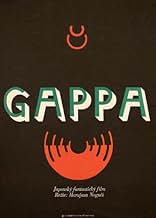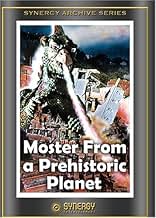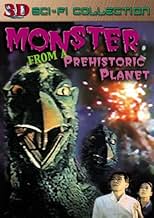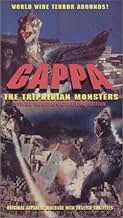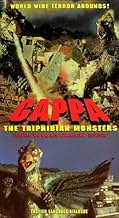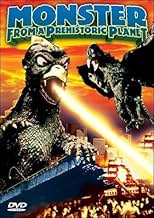IMDb RATING
4.4/10
1.8K
YOUR RATING
Magazine reporters Hiroyuki Kurosaki and his colleagues brought back to Japan a monster child who had just hatched from an egg issued on the isolated island of Obelisk in the South Sea.Magazine reporters Hiroyuki Kurosaki and his colleagues brought back to Japan a monster child who had just hatched from an egg issued on the isolated island of Obelisk in the South Sea.Magazine reporters Hiroyuki Kurosaki and his colleagues brought back to Japan a monster child who had just hatched from an egg issued on the isolated island of Obelisk in the South Sea.
Tamio Kawaji
- Hiroshi Kurosaki
- (as Tamio Kawachi)
Yûji Odaka
- Prof. Daize Tonooka
- (as Yuji Kodaka)
Yôko Ôyagi
- Aihara
- (as Yoko Oyagi)
Storyline
Did you know
- TriviaThe main and end title music heard in the overseas releases of this film (for example, Monster from a Prehistoric Planet in the U.S.) were from an earlier film also scored by Seitaro Omori, the Nikkatsu teen drama/comedy film Youth Song (1959).
- GoofsAt 54:00 when airplanes attack the Gappas, for a brief moment during a view from an airplane target one can see where the fake sky backdrop ends and the movie studio beyond it.
- Quotes
President Funazu: Like it? I call it Playmate Land.
- Alternate versionsIn all English-dubbed versions of the film, the rock and roll theme song titled "Great Giant Beast Gappa" (heard in both the opening credits and the ending of the original Japanese version of it) is replaced by standard orchestral music. Also, the Japanese version features a song titled "Keep Trying, Baby Gappa!" (heard in the scene at the end of the film where the male and female Gappas are reunited with their baby). In all English-dubbed versions, the song's vocals are cut and thus, it becomes an instrumental song.
- ConnectionsEdited into Red Dwarf: Meltdown (1991)
- SoundtracksDaikyojû Gappa
("Great Giant Beast Gappa")
Opening and Ending Theme (Japanese version only)
Music by Masao Yoneyama
Arrangement by Iwao Shigematsu
Lyrics by Hikari Ichijô
Performed by Katsuhiko Miki
Featured review
A group of intrepid explorers is sent on an expedition to find exotic animals (and people) for a new theme park to be built by a magazine tycoon who also happens to publishes Playmate Magazine. Soon, the group lands on an island in the South Pacific, where they discover an isolated tribe of natives who worship a mysterious God named Gappa. When the land is ruptured by an earthquake, the explorers come upon a cavern containing a reptilian egg. They take it back to a Japanese research center, where the creature hatches and is studied by a group of not too bright scientists. Unfortunately, the parental Gappas show up to claim their newborn lizard, trashing most of Tokyo in the process.
I had a great time watching this piece of nonsense. Just about everything in this film is a complete riot. After a somewhat slow first half, the action is almost non-stop and there's plenty of stupendous dialog to keep you entertained. The production values consist mostly of hilariously cheap-looking scale models, the story and the acting are ridiculous and most of the characters are empty-headed idiots, especially for a group of scientists. The monster, Gappa, is a kind of bird-lizard, basically a ridiculous looking over-sized chicken. When it flies, it sounds like an airplane, but that's probably the result of a slip-up in the sound effects, because the creature gets attacked by fighter planes a couple of times.
Made by the Nikkatsu Studios to make a late cash-in on the success of Godzilla- and many other monster movies and - what I understand - it was also meant as a kind of satire on the monster movie craze. Well, that aspect of the film was a bit lost on me, or probably got lost in time or translation, but then, I'm hardly an expert on Japanese old-school kaiju-flicks.
Camera Obscura --- 6/10
I had a great time watching this piece of nonsense. Just about everything in this film is a complete riot. After a somewhat slow first half, the action is almost non-stop and there's plenty of stupendous dialog to keep you entertained. The production values consist mostly of hilariously cheap-looking scale models, the story and the acting are ridiculous and most of the characters are empty-headed idiots, especially for a group of scientists. The monster, Gappa, is a kind of bird-lizard, basically a ridiculous looking over-sized chicken. When it flies, it sounds like an airplane, but that's probably the result of a slip-up in the sound effects, because the creature gets attacked by fighter planes a couple of times.
Made by the Nikkatsu Studios to make a late cash-in on the success of Godzilla- and many other monster movies and - what I understand - it was also meant as a kind of satire on the monster movie craze. Well, that aspect of the film was a bit lost on me, or probably got lost in time or translation, but then, I'm hardly an expert on Japanese old-school kaiju-flicks.
Camera Obscura --- 6/10
- Camera-Obscura
- Jan 12, 2007
- Permalink
- How long is Gappa the Triphibian Monster?Powered by Alexa
Details
- Release date
- Country of origin
- Language
- Also known as
- Gappa the Triphibian Monsters
- Production companies
- See more company credits at IMDbPro
- Runtime1 hour 30 minutes
- Sound mix
- Aspect ratio
- 2.35 : 1
Contribute to this page
Suggest an edit or add missing content

Top Gap
By what name was Gappa the Triphibian Monster (1967) officially released in India in English?
Answer

